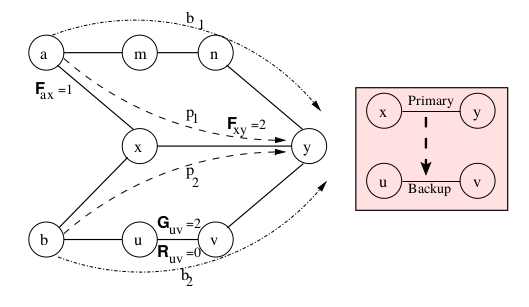
Links
Abstract
A Network Service Provider (NSP) operating a label-switched networks such as ATM or Multi-Protocol Label Switching (MPLS) networks, sets up end-to-end bandwidth-guaranteed Label-Switched Paths (LSPs) to satisfy the connectivity requirements of its client networks. To make such a service highly available, the NSP may set up one or more backup LSPs for every active LSP. The backup LSPs are activated when the corresponding active LSP fails. Accordingly, the problem of LSP routing with and without restoration backup has received some attention in the recent past.</p><p>In this paper, we investigate distributed algorithms for routing of end-to-end LSPs with backup restoration in the context of label-switched networks. Specifically, we propose a new concept of the Backup Load Distribution (BLD) matrix that captures partial network state and eliminates the problems of bandwidth wastage, pessimistic link selection, and bandwidth release ambiguity. We describe two new, distributed routing algorithms that utilize the BLD matrix and require a bounded amount of run time. We can realize these algorithms in the current Internet architecture using the OSPF extensions for Quality-of-Service (QoS) routing to exchange the proposed BLD matrix among peer routers/switches. Our simulation results for realistic sample topologies show an excellent (30-50%) improvement in terms of rejected requests and 30-40% savings in the total bandwidth used for backup connections. We also show that, although the performance of our routing scheme is sensitive to the frequency of BLD matrix updates, the performance degradation resulting due to stale state information is insignificant for typical update periods.
BibTeX (Download)
@article{Norden2004Routing,
title = {Routing Bandwidth Guaranteed Paths with Restoration in Label Switched Networks},
author = {Samphel Norden and Milind M. Buddhikot and Marcel Waldvogel and Subhash Suri},
url = {https://netfuture.ch/wp-content/uploads/2004/norden04routing.pdf},
year = {2004},
date = {2004-10-07},
urldate = {1000-01-01},
journal = {Computer Networks},
volume = {46},
number = {2},
pages = {197-218},
abstract = {A Network Service Provider (NSP) operating a label-switched networks such as ATM or Multi-Protocol Label Switching (MPLS) networks, sets up end-to-end bandwidth-guaranteed Label-Switched Paths (LSPs) to satisfy the connectivity requirements of its client networks. To make such a service highly available, the NSP may set up one or more backup LSPs for every active LSP. The backup LSPs are activated when the corresponding active LSP fails. Accordingly, the problem of LSP routing with and without restoration backup has received some attention in the recent past.</p><p>In this paper, we investigate distributed algorithms for routing of end-to-end LSPs with backup restoration in the context of label-switched networks. Specifically, we propose a new concept of the Backup Load Distribution (BLD) matrix that captures partial network state and eliminates the problems of bandwidth wastage, pessimistic link selection, and bandwidth release ambiguity. We describe two new, distributed routing algorithms that utilize the BLD matrix and require a bounded amount of run time. We can realize these algorithms in the current Internet architecture using the OSPF extensions for Quality-of-Service (QoS) routing to exchange the proposed BLD matrix among peer routers/switches. Our simulation results for realistic sample topologies show an excellent (30-50%) improvement in terms of rejected requests and 30-40% savings in the total bandwidth used for backup connections. We also show that, although the performance of our routing scheme is sensitive to the frequency of BLD matrix updates, the performance degradation resulting due to stale state information is insignificant for typical update periods.},
keywords = {Traffic Engineering},
pubstate = {published},
tppubtype = {article}
}



